Today Current Affairs: 18th November 2022 for UPSC IAS exams, State PSC exams, SSC CGL, State SSC, RRB, Railways, Banking Exam & IBPS, etc
Table of Contents
First Virtual Global Skill Summit:
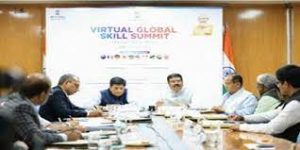
Different ministries have organized 1st virtual global skill summit with an Indian mission in ten countries to facilitate overseas mobility of the skilled Indian workforce, in line with the government’s vision of making India the skill capital of the world.
Initiatives:
- India International Skill Centre: It ensures International workforce mobility opportunities for Indians
- NSDC International: To ensure overseas employment through specific programmes
- Skill India International Project: To help in skilling, certification and overseas employment of Indian
- International Partnership: Trainer-Assessor Academies with Singapore; UK India Education and Research Initiative (UKIERI) etc.
- The NEP 2020 has set the goal of exposing at least 50% of learners of the school and higher education systems to vocational education
- According to a Ministry of External Affairs report, there are 32 million NRIs and OCIs residing outside India and overseas Indians comprise the world’s largest overseas diaspora
- Saudi Arabia has the highest number of Indians ( almost 9.8% of Saudi’s overall population)
Patan Patola Scarf:
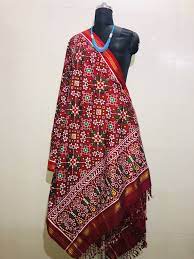
Prime Minister of India gifted a ‘Patan Patola’ scarf to the Prime Minister of Italy at the G20 summit.
- Patola is a double ikat woven fabric, usually made from silk in Patan (North Gujarat).
- Ikat is a method of tie-dyeing the warp or weft before the cloth is woven.
- It received a Geographical Indication (GI) tag in 2013.
- The ancient art of double ikat or Patola woven in pure silk dates back to the 11th century.
- This peculiar quality has its origins in an intricate and difficult technique of dyeing or knot dyeing, known as ‘bandhani’, on the warp and weft separately before weaving.
- Patola is woven on primitive hand-operated harness looms made out of rosewood and bamboo strips. The loom lies on a slant.
- The other commonly worn Patola is the Rajkot Patola, woven on a flat loom.
- The base price of a Patola saree in the Patan weave starts from Rs 1.5 lakh up and can go up to Rs 6 lakh.
What Is Friendshoring?
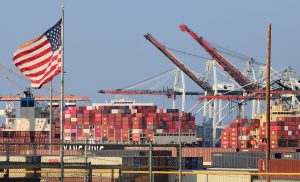
The US secretary of treasury has pushed for “friendshoring” to diversify trade away from countries that are present at geopolitical risk.
- Friendshoring is a strategy where a country sources the raw materials, components and even manufactured goods from countries that share its values.
- The dependence on the countries considered a “threat” to the stability of the supply chains is slowly reduced.
- It is also called “allyshoring”.
- Friend-shoring or ally-shoring has become a means for the US to influence firms to move their sourcing and manufacturing sites to friendly shore often back to the same shores in the case of the US.
- The purpose of Frienshoring is to insulate countries supply chains from less like-minded nation.
G-20 Summit 2022:
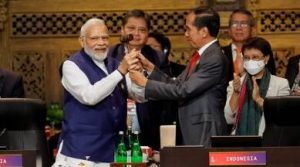
The 17th annual summit of G-20 was hosted by the Indonesian G20 presidency in Bali under the theme ‘Recover Together, Recover Stronger’.
- Now, India has assumed the charge of the G20 presidency and the 18th summit will be held in India in 2023.
- Member countries adopted a declaration deploring Russia’s aggression in Ukraine “in the strongest terms” and demanding its unconditional withdrawal.
- They also recognised that while most members condemned the war in Ukraine, “there were other views and different assessments of the situation and sanctions”.
- The G20 economies agreed in their declaration to pace interest rate rises carefully to avoid spillovers and warned of “increased volatility” in currency moves, a sea change from last year’s focus on mending the scars of the Covid-19 pandemic.
- The leaders promised to take coordinated action to address food security challenges and applauded the Black Sea grains initiative.
- G20 leaders agreed to pursue efforts to limit the global temperature increase to 1.5 degrees Celsius – confirming they stand by the temperature goal from the 2015 Paris Agreement on climate change.
- Leaders recognised the importance of digital transformation in reaching the sustainable development goals.
- They encouraged international collaboration to further develop digital skills and digital literacy to harness the positive impacts of digital transformation, especially for women, girls, and people in vulnerable situations.
- Leaders also expressed their continuous commitment to promoting a healthy and sustainable recovery which builds towards achieving and sustaining universal health coverage.
- They welcomed the establishment of a new financial intermediary fund for pandemic prevention, preparedness and response (the ‘Pandemic Fund’) hosted by the World Bank.
- Leaders reaffirmed their commitment to strengthen global health governance, with the leading and coordination role of World Health Organisation (WHO) and support from other international organisations.
Fourth Phase Of Digital Shakti Campaign:
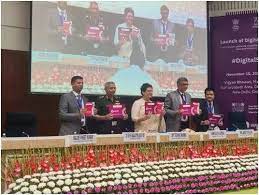
The National Commission for Women (NCW) has recently launched the fourth phase of Digital Shakti Campaign.
- Digital Shakti started in June 2018 to help women across the nation to raise the awareness level on the digital front, to build resilience, and fight cyber-crime in the most effective ways.
- The Digital Shakti 4.0 is focused on making women digitally skilled and aware to stand-up against any illegal/inappropriate activity online.
- NCW launched the campaign in collaboration with CyberPeace Foundation and Meta.
- Through this project, over 3 Lakh women across India have been made aware of cyber safety tips and tricks.
- It is helping women in reporting & redressal mechanisms, data privacy and usage of technology for their benefits.
National Technical Textiles Mission (NTTM):

The Ministry of Textiles in partnership with Northern India Textile Research Association (NITRA) and Indian Technical Textile Association (ITTA) organized a full-day event “National Conclave on Technical Textiles – Protech”
- Technical Textiles are textile products which are manufactured primarily for their functionality and use rather than the aesthetic appeal.
- These products are broadly classified into 12 different categories- Agrotech, Oekotech, Buildtech, Meditech, Geotech, Clothtech, Mobiltech, Hometech, Sportstech,Indutech, Protech, Packtech.
- The Ministry of Textiles has launched NTTM to increase the penetration level of technical textiles in India while leveraging the extraordinary growth rate of the sector.
- The Indian Technical Textiles Sector has an Annual Average Growth Rate (AAGR) of 12% which is three times the world average of 4%.
- The aim of the mission is to position India as a global leader in Technical Textiles.
- The NTTM has been approved with an implementation period of four years starting from FY 2020-21 till FY 2023-24.
- The total outlay of the mission is INR 1480 Cr.
- The Mission has a target to take domestic market size of technical textile sector to $ 40-50 Bn by the year 2024 with an average growth rate of 15-20% per annum.
Vikram-Suborbital Rocket : Set To Launch

ISRO is set to launch India’s first privately built rocket (Vikram-suborbital (VKS) rocket) from Sriharikota.
- VKS rocket is developed by the the non-government entity/startup, Skyroot Aerospace Pvt Ltd (SAPL).
- Apart from being the nation’s first private launch, it will also be the maiden mission of Skyroot Aerospace, named ‘Prarambh’.
- It will carry a total of three payloads in space, including one from the foreign customers.
VKS rocket:
- It is a single stage spin stabilized solid propellant rocket with mass of approx. 550 kilograms.
- The rocket goes to the max altitude of 101 kilometers and splashes into the sea and the overall duration of launch is 300 seconds only.
- Skyroot was the first startup to sign a Memorandum of Understanding with ISRO for launching its rockets.
What Is Moscow Format?
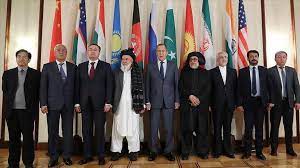
India joined the meeting of the ‘Moscow format consultations on Afghanistan’ that was in the Russian capital.
- The Moscow format is one of the several dialogue platforms on Afghanistan which began before the Taliban takeover of Kabul.
- It consists of Russia, China, Pakistan, Iran, Kazakhstan, Tajikistan, Kyrgyzstan, Uzbekistan, Turkmenistan and India.
- The key objective of the Moscow format of consultations is to facilitate the national reconciliation process in Afghanistan to establish peace.
- During the meeting, the participants discussed issues related to Afghanistan, including the current humanitarian situation and the ongoing efforts of various stakeholders to provide assistance, intra-Afghan talks, formation of an inclusive and representative government.
Carbon Border Tax:

India, China, Brazil, South Africa opposed ‘carbon border tax’ proposed by European Union in the 27th edition of the Conference of Parties (COP) in Sharm El Sheikh.
- The European Union has proposed a policy called the Carbon Border Adjustment Mechanism to tax products such as cement and steel, that are extremely carbon intensive, with effect from 2026.
- BASIC, a group constituting Brazil, India, South Africa and China, and therefore large economies that are significantly dependent on coal, has reiterated their right to use fossil fuel in the interim during their countries’ eventual transformation to clean energy sources.
- Carbon border adjustment tax is a duty on imports based on the amount of carbon emissions resulting from the production of the product in question.
- As a price on carbon, it discourages emissions.
- As a trade-related measure, it affects production and exports.
- There is the risk that it becomes a protectionist device, unduly shielding local industries from foreign competition in so-called ‘green protectionism’.
- If implemented as planned, EU importers will have to buy carbon certificates corresponding to the carbon price that would have been paid in the EU, if the goods had been produced locally.
- The price of the certificates would be calculated according to the auction prices in the EU carbon credit market.
- The amount of certificates required would be defined yearly by the quantity of goods and the embedded emissions in those goods imported into the EU.




